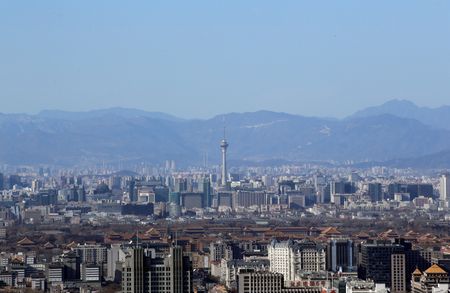By Kevin Yao
BEIJING (Reuters) – China is becoming increasingly ambitious with its 2023 growth target, aiming potentially as high as 6%, in a bid to boost investor and consumer confidence and build on a promising post-pandemic recovery, sources involved in policy discussions said.
Four of the sources said China was likely to aim for growth up to 6%, while three others said China was targeting 5%-5.5%. They all spoke on condition of anonymity as the discussions were held behind closed doors.
In all, those numbers point to rising optimism within Chinese policy circles compared with November, when government advisers recommended more modest targets ranging from 4.5% to 5.5%.
The previous recommendations were made weeks before China lifted the world’s harshest COVID-19 curbs. Recent data showed the economy recovering from its pandemic shock at a better-than-expected pace.
The final growth target, which can be a range, will be announced on March 5, at the start of China’s annual legislative meeting.
“This year’s growth target could be 5-6%,” said one of the people involved in the discussions. “We need to achieve an economic recovery, boost employment, and confidence, these are the key factors we need to consider.”
One of the three sources advocating for a more modest target warned “the property sector is still falling and it’s difficult to fill the gap while foreign trade is likely to drag on economic growth this year.”
None of the seven sources is involved in the final decision-making process.
The government is also set to unveil more stimulus during this month’s National People’s Congress, to mitigate the impact of property market weakness and waning global demand for its exports, four of the people said.
To spur growth, the government is expected to widen its annual budget deficit to around 3% of gross domestic product this year and issue about 4 trillion yuan in special bonds to support investment spending, they said.
The new economic leadership team, expected to be led by former Shanghai Communist Party chief Li Qiang as China’s new premier, are keen to show their ability to deliver better economic growth to create more jobs and ease funding strains on local governments, the four said.
BIG MISS
China’s economy grew 3% in 2022 from a year earlier, badly missing the official target of around 5.5%, as the COVID-19 pandemic, property market stress and slowing global demand took a heavy toll. Excluding 2020, when the pandemic started, it was the worst performance since 1976 – the final year of Mao Zedong’s decade-long Cultural Revolution that wrecked the economy.
It was also the biggest ever miss of a growth target. China previously only had narrow misses during the Asian financial crisis in the late 1990s and during a currency crisis in 2014-15.
The last time China set a target range was in 2019 at 6-6.5%.
Some economists argue that ambitious annual growth targets in China are counterproductive, and policymakers should rather focus on structural reforms to improve the sustainability of any economic expansion.
Lofty goals have in the past pressured local governments to launch expensive infrastructure projects, which have contributed significantly to China’s overall indebtedness of almost 300% of economic output.
Three of the sources also said China will stick to the long-standing inflation target of around 3%.
STRONG START
Consumption and services are leading China’s recovery so far this year. Manufacturing activity also expanded at the fastest pace in more than a decade in February, an official survey showed on Wednesday, beating expectations.
Iris Pang, chief Greater China economist at ING, said in a note that this week’s upbeat data gave the government strong reasons to set a high growth target of 5.5% to 6%.
On March 5, outgoing Premier Li Keqiang is due to deliver the 2023 government work report, which includes key economic goals and policy priorities.
Li was quoted by state media on Wednesday as saying that the government was still amending the work report.
“This year’s growth will be higher than 6%, which is not high considering last year’s low base,” Yu Yongding, an influential government economist who previously advised the People’s Bank of China, told Reuters.
Yu said a growth target of above 6% would help “boost morale and stimulate China’s economic growth potential.”
(Reporting by Kevin Yao; Editing by Marius Zaharia & Shri Navaratnam)





